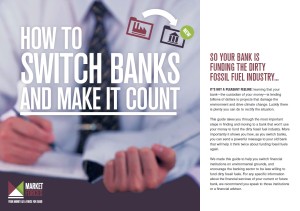Divestment
Quite simply, divestment is the opposite of investment – the action of removing money that has been invested somewhere.
Divestment has taken on great significance as a global movement as more individuals and institutions take action to ensure their money is not being used to fund projects and industries that they don’t agree with.
The movement is fuelled by a growing awareness of how personal finances are exposed to environmentally damaging projects through the banks, super funds and share portfolios that they are invested with. You can use resources like our bank comparison table and super funds comparison table to find out if your savings are being invested in dirty fossil fuels and take action to align your money with your values.
Divestment is a major step towards cutting your ties with climate wrecking fossil fuels and therefore reducing your carbon footprint. It sits alongside moves such as switching to a renewable energy provider and cutting gas use as one of the most effective ways to reduce your personal carbon footprint.
The power of divestment
Divestment is a double-edged sword that climate campaigners and the concerned public are using to simultaneously remove finance from the fossil fuel sector, and raise awareness about the need to shift away from our current reliance on the industry.
Obviously the economic impact of one person removing their savings from a bank or switching super funds isn’t going to cripple the fossil fuel industry, but by taking a stand, voting with their money and publicising their actions, those who divest can make a real and measurable impact.
A 2018 article from University of Sussex’s Science Policy Research Unit looked into the impact of divestment: “Divestment has put questions of finance and climate change on the agenda and played a part in changing discourse around the legitimacy, reputation and viability of the fossil fuel industry.
This cultural impact contributed to changes in the finance industry through new demands by shareholders and investors and to changes in political discourse, such as rethinking the notion of ‘fiduciary duty.’ Finally, divestment had significant impact on its participants in terms of empowerment and played a part in the revitalisation of the environmental movement in the UK and elsewhere.”
Financial experts note that divestment has had a significant impact on coal companies in particular:
“We’ve noticed that a growing number of investors and financial institutions have announced bans or restrictions on coal investments, particularly from 2013, which have in our view been a driver of the [circa 60% coal] sector de-rating over the past five years.” – Goldman Sachs, 2018
“Divestment increases the cost of capital for fossil fuel companies. Imperceptibly at first, but then – as coal has found – meaningfully. It also shuts off access to talent, and scares off allies.” – Michael Liebreich, Chairman and CEO, Liebreich Associates
Check out our how to switch banks page to find out more about making the most of divestment action.
Why do people divest?
As evidenced by the many different divestment stories shared with us here at Market Forces, as well as those from around the world, there is a wide range of individual motivations behind divestment actions.
Obviously, the recognition of the devastating impact on fossil fuels use on climate change is a major inspiration, however there are also many more localised and specific environmental problems caused – and threats posed – by the fossil fuel industry.
“The financial case for fossil fuel divestment is strong. Over the past three and five years, respectively, global stock indexes without fossil fuel holdings have outperformed otherwise identical indexes that include fossil fuel companies. Fossil fuel companies once led the economy and world stock markets. They now lag.” – Institute for Energy Economics and Financial Analysis (IEEFA) and Sightline Institute (2018)
Further to the above quote, IEEFA lists over 100 globally significant banks and insurers that have announced their divestment from coal mining and/or coal-fired power plants.
The issue of unburnable carbon and the resulting danger of fossil fuel companies being left with stranded assets has been raised by many financial experts, including those from Aviva Investors, Deutsche Bank, The Bank of England and even president of the World Bank Jim Yong Kim, who has said, “Every company, investor and bank that screens new and existing investments for climate risk is simply being pragmatic.”
Want to get your divestment journey started? Put your bank on notice by completing the form adjacent.
History
As of June 2020, institutions managing more than US$14 trillion have committed to divest, while more than 58,000 individuals have registered divestment commitments of $5.2 billion.
One of the most noteworthy divestment actions to date has been the Norwegian sovereign wealth fund’s decision to ditch its holdings in companies that derive more than 30% of their business or revenue from coal. Valued at over $1 trillion, the fund’s decision to divest was largely brought about by sustained community pressure.
More recently BlackRock, one of the world’s largest fund managers, vowed to divest from thermal coal.
As reported by GoFossilFree.org, some other great examples of institutional divestment include the Rockefeller Brothers Fund, the British Medical Association, New York City and Ireland.
More locally, a host of divestment commitments have been made including the cities of Sydney, Melbourne and Newcastle, La Trobe University and health fund Medibank, among hundreds of other institutions.
Want to tell others about divestment? Check out our campaign materials.
Our new Out of Line, Out of Time report is out!
Super funds’ dirty, poor performing stocks revealed https://t.co/qKlvy7UOcv via @finstd
Check out the full report and take action to get your retirement savings out of dirty fossil fuels: https://t.co/RMOEfAkOl7
— Market Forces (@market_forces) March 31, 2020
Once again @BillGates demonstrates he doesn't understand the low-carbon transition. #Divestment increases the cost of capital for fossil fuel companies. Imperceptibly at first, but then – as coal has found – meaningfully. It also shuts off access to talent, and scares off allies. https://t.co/Wfptc0CYDH pic.twitter.com/Mslcitjl5O
— Michael Liebreich (@MLiebreich) September 19, 2019
“Divestment serves to delegitimise the business models of companies that are using investors’ money to search for yet more coal, oil and gas that can’t safely be burned.
It is a small but crucial step in the economic transition away from a global economy run on fossil fuels.”


